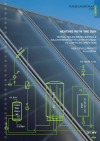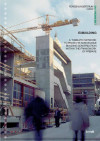Suchergebnisse
Contracting as a instrument for renovation

Development of contracting models for comprehensive renovation service packages.
SOL4 business and training center Eichkogel

Demonstration project for sustainable construction of a working and living environment
Industrially produced residential dwellings

Potential of future development for industrially produced residential dwellings Enquiry on international tendencies in automated manufacturing and assessment of viable strategies for their implementation into the Austrian building sector
First passive-house school reconstruction

Factor 10 refurbishment of the General Secondary School II and Polytechnic School of Schwanenstadt (Upper Austria) with prefabricated wooden façade elements and with a comfort ventilation system.
Architecturally Diverse, Energetic Renewal

Post War Modernist Buildings Under Monument Protection. A Comparative Analysis of Energy Efficient Renewal Case study: Open Air School Franklinstrasse, Wien 21
Heating With The Sun

Partial solar heating & solar systems with layer storage in low-flow operation New developments in Austria
Forschungsforum
2/1997
Herausgeber: BMVIT
Englisch, 6 Seiten
Downloads zur Publikation
Daylight In Buildings

Austria´s contribution to Task 21 of IEA "Solar Heatin and Cooling" Program
Forschungsforum
3/2000
Herausgeber: BMVIT
Englisch, 6 Seiten
Downloads zur Publikation
Zero Carbon Buildings International - Evaluation and Analysis
Analysis of the performance of a demonstration building on the Philippines and potential for transferability to other developing and newly industrialising countries.
E3 Building

A thematic network to promote sustainable building constructio within the framework of PREPARE
Forschungsforum
1/2001
Herausgeber: BMVIT
Englisch, 6 Seiten
Downloads zur Publikation
Homeservices by the company of tomorrow
Sustainable services in co-operation with the housing sector will be investigated, their effects on environment, employment, acceptance by consumers, hindrances as well as prerequisites for sustainable facility management and a new positioning of concierge systems analysed.
Contracting Platform for SME´s
Evaluation of requirements and framework conditions for the implementation and the operation of a Contracting Platform for SME´s in Austria for the cost efficient identification and realisation of energy efficiency measures.
Knowledge based determination of plant species
Pollen for medical applications can be sorted by special machines. An integrated database and a spectrometric calibration allow a precise separation of the species with an identification of the plant species.
IEA FBC Implementing Agreement Fluidized Bed Conversion (working period 2009 - 2013)
Overview of the current status of the fluidized bed technology worldwide in regards to energy technology.
Innovative Refurbishment of Single Family Houses

Evaluation of best-practice models and recommendations to support dissemination
S I P settlement models in passive house quality
Research, development and realization of integral building concepts in passive house quality!
Urban Future - "Resource Efficient City of Tomorrow"
Challenges fort he cities of tomorrow with research issues referring to resource management, efficiency and technology development
Sustainable energy supply for Austria
Rapidly increasing energy consumption and decreasing resources of fossil fuels lead to dramatical economical, ecological and social problems.This study identified the feasible long term potential of renewable energy sources. Then ways were developed how to supply the demand for future energy consumption with renewable energy sources, despite increasing energy services.
Linking Low Carbon Technologies with Low Carbon Society

The project „Linking Low Carbon Technologies with Low Carbon Society“ was conducted on behalf of the Federal Ministry of Transport, Innovation and Technology. In the course of the project a number of recent empirical studies on rebound effects were analysed. Based on this comprehensive analysis an overview of strategies for rebound management was compiled and policy recommendations for the technology sector were developed.
Solar energy - a significant economic factor

Major goals of this study were determination of the number of jobs provided in the thermal solar energy sector, the added economic value created in this sector and the predicted effects of achieving the goals, in order to better evaluate the economic significance of the use of thermal solar energy.
Sanierung PRO!

The goal of the project is the development of a guideline, which supports builders and planners or consultants in the organization and monitoring of inhabitant integration into the reorganization processes of multi-storey housing.
